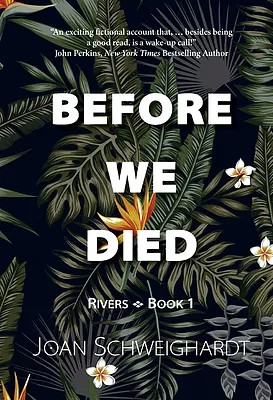
Today, we’re pleased to present an excerpt from Before We Died, the first book in Joan Schweighardt’s Rivers Trilogy.
The excerpt opens in 1907, in Hoboken, New Jersey. Irish American brothers Jack and Baxter Hopper hope to leave their jobs working on the docks of Hoboken so as to travel to the South American rainforest to become rubber tappers. But they must first find a patron who will pay for their ship passage and the supplies they’ll need. It is Baxter who travels across the river to New York to meet with Abalo, a potential patron, and Jack, the narrator of Before We Died, who describes Baxter’s telling of how the interview went.
***
Nora and Bax were standing at the door when I got in from the docks that night. I had to plow my way through to get inside and out of my jacket. Even Mum was standing nearby, wringing her hands and looking jazzed. Bax had been back from his meeting for a while by then, but he’d made the ladies wait till I got home, not because he didn’t like to repeat himself—old Bax never had a problem there—but because he wanted to feed the drama, as was also his way.
“So he says to me,” Bax said to us soon as I sat down, referring to this Abalo chap. “How do I know you can do the work? Why would I want to be pouring money into men I have no proof can keep up? I heard longshoremen were a shiftless lot.”
Bax took a step back, so that he was dead center in the room, to demonstrate how he answered. With his chin raised, his legs apart, and his arms folded over his chest, he could have been Hercules himself standing there. “Shiftless, you say? Listen here, I says to the old kinker, I could well name some shiftless bods out there on the docks, but me and Jack would not be among them. I says to him, Me and Jack, we’ve carried sugar, flour, beef and coal, and much more, in crates weighing twice as much as our own woebegone selves on our young backs, and no one ever saw us as much as flinch. Me and Jack have labored in the piercing cold of winter morns, before there was even a glim in the sky, and under the hottest midsummer sun, working sometimes twenty hours straight, doing what must be done to get our ships loaded and out to sea. We have worked with sponges tied over our ugly gobs to keep the fumes from some of them hauls from choking us down. We have worked bruised and cut and oozing pus from the bottoms of our feet. We have worked sick as dogs. We have worked bleeding like goats, me and Jack have. We have forced our big bodies into wee narrow spaces to take on cargo, and we have lifted above our heads barrels that would kill us fast if one of the other macs was to lose his footing. So say what you will about longshoremen, my good man, but don’t dare say it about Jack and me, and never say it again in my presence.”
Baxter nodded once, to let us know the drama was over for now—though he maintained his heroic stance in the middle of the room. Nora turned to Mum at once, her jaw dropped open with delight. Mum stretched her lips out flat in response, closest she could get to a smile these days. “And what did he say to that?” I asked. My brother could be a doozer when he wanted. I was the serious one, the thinker. Sometimes I found me miserable self with thoughts behind my thoughts. But I could never have come back at Abalo the way old Bax did. And I will not deny it grieved me some to be lacking Baxter’s fire.
Bax waited to be sure he had our full attention. “He said, You and your brother, you’ve got yourself a job.”
Follow Vol. 1 Brooklyn on Twitter, Facebook, and sign up for our mailing list.
